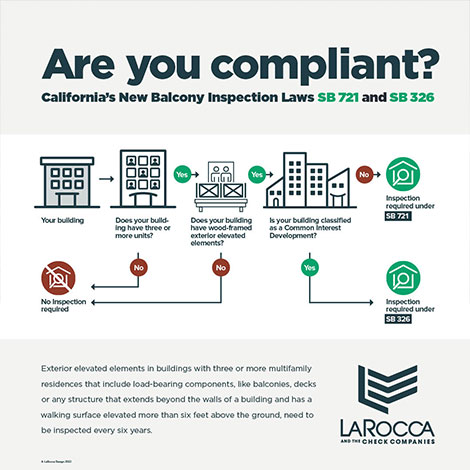California’s New Balcony Inspection Laws

Calif. Civil Code §1954
Calif. Health and Safety Code §17973
Amended by S.B. 721
Effective date: January 1, 2019
Exterior elevated elements in buildings with three or more multifamily residences that include load-bearing components, like balconies, decks or any structure that extends beyond the walls of a building and has a walking surface elevated more than six feet above the ground, need to be inspected every six years.
Inspections need to be performed by a licensed architect, licensed civil or structural engineer, building contractor holding “A,” “B,” and/or “C-5” license classifications with at least five years’ experience in constructing multistory wood frame buildings, certified building inspector or building official from a recognized state, national, or international association. Inspectors may not be employed by the local jurisdiction while performing these inspections.
The owner of the building needs to hire the inspector.
The inspection needs to determine whether exterior elevated elements and their waterproofing elements are safe, in working order, and free from hazardous conditions caused by fungus, deterioration, decay, and improper alteration.
The inspector’s report, presented to the owner within 45 days of the completion of the inspection, needs to include:
The current condition of the exterior elevated elements;
Expectations of future performance and projected service life; and
Recommendations of any further inspections.
To comply with this new law, an initial inspection needs to be completed by January 1, 2025 and every six years thereafter. Buildings whose permit applications are submitted after January 1, 2019 need to be inspected no later than six years after the certificate of occupation has been issued.
When a building has been inspected within three years prior to January 1, 2025 and the report finds the building poses no health and safety risks, no new inspection will be required until January 1, 2025.
When an inspector finds a deficiency, the owner of the building needs to correct it. Recommended repairs cannot be performed by the inspector. Instead, they need to be done by a qualified and licensed contractor who complies with:
The inspector’s recommendations;
Any applicable manufacturer’s specifications
The California Building Standards Code
All local jurisdictional requirements
When an inspector finds an exterior elevated element poses an immediate safety threat or emergency condition, the owner needs to perform the required preventative measures immediately. Those repairs need to be inspected and reported to the local enforcement agency.
When an inspector identifies a deficiency in an exterior elevated element not constituting an emergency condition, the owner needs to apply for a permit within 120 days to correct it unless granted an extension by the local enforcement agency.
When the owner does not comply with repair requirements within 180 days, the inspector needs to notify the owner and the local enforcement agency. When the owner does not complete repairs within 30 days of that notice, the owner will be assessed a civil penalty between $100 and $500 per day until the repairs are completed unless an extension is granted by the local enforcement agency.
When a civil penalty is assessed, a building safety lien may be recorded with the force, effect, and priority of a judgment lien. The lien may be foreclosed by an action brought by the appropriate local jurisdiction for a money judgment.
The county recorder may charge the city for processing and recording the lien and providing notice to the owner. The city may recover from the owner costs related to processing and recording the lien and providing notice as part of its foreclosure in enforcing the lien.
Local law enforcement agencies may recover enforcement costs associated with these requirements.
The inspection of buildings proposed for conversion to condominiums to be sold after January 1, 2019 needs to be conducted before the first close of escrow of a separate interest in the project. Common interest developments are exempt from this inspection requirement.
On advance notice to the tenant, the landlord has the right to access the property with an inspector to comply with these inspection requirements.

